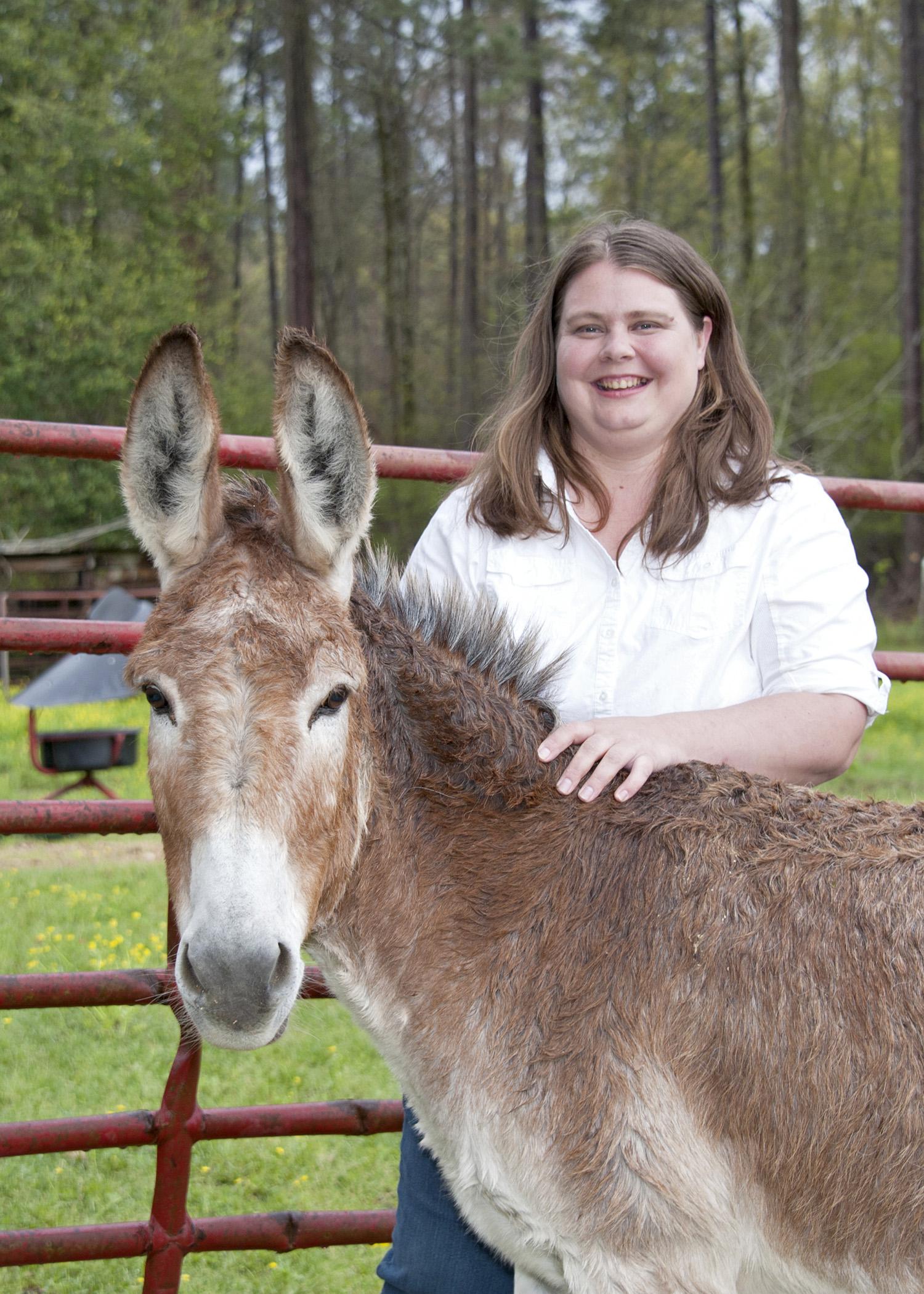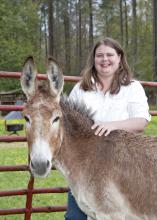Information Possibly Outdated
The information presented on this page was originally released on May 5, 2014. It may not be outdated, but please search our site for more current information. If you plan to quote or reference this information in a publication, please check with the Extension specialist or author before proceeding.
MSU Extension helps farmer create her dream
MEADVILLE – A Meadville farmer is building her dream job a few animals at a time.
Anita Leonard, a native of Enid, Oklahoma, married her husband Harold and relocated to Mississippi just more than five years ago. Together, they began building the farm Anita had longed for since she was a child.
They have about 60 beef cattle, four donkeys, 100 laying hens, 15 roosters, two geese, two guineas, 18 bee hives, one dog and two cats. Leonard raises a vegetable garden, grows fruit trees, and helps with several goats and pigs that are housed on their property. Leonard manages the day-to-day operations of the farm while her husband works off-farm.
“People often ask me how I get all these projects done, since I’m the only one working on them and sitting with my mother-in-law,” Leonard said. “The answer is my husband helps me when he’s not working, and I try to plan my work. For example, when I work with the bees, I work all of the hives. That day, I don’t do much with chickens except gather the eggs and release them to free-range and make sure they have feed and water. The next day may be the day for gardening or mulching fruit trees.”
She also likes breeds of animals that are self-sufficient, such as chickens that are heavy foragers and bees that manage their own hives.
Because she is not an experienced farmer, Leonard said she relies a lot on the advice of her mother-in-law and husband. She has also turned to the Mississippi State University Extension Service for training.
“I’ve taken beekeeping and gardening courses, participated in Annie’s Project and consulted many of the online resources MSU has available,” she said.
Leonard, who lived on a tiny, urban lot growing up, said her family used the local Extension Service as a resource. It was then she learned to trust the research-based information provided by her county agent.
“My dad grew up on a farm and was always a farm boy at heart,” Leonard said. “Wherever we lived, he always turned it into a mini farm. We had something growing on every inch of ground we owned.
“Growing up, we went to classes that the Extension Service had on canning and learned how to can certain types of food with different methods. We also learned how to tell if something was still sealed properly or spoiled,” she said.
In a way, Leonard’s work ethic and desire to spend her days homesteading pays tribute to her grandmother, who provided some of Leonard’s earliest and fondest memories of farm living.
“My brother, cousin and I would play on the old farm equipment dotting the place, and we enjoyed the preserved fruits and vegetables from the garden,” she said. “Even after I graduated from college and was working in Wichita, Kansas, what I really wanted was to have a compost bed and a garden, some chickens, and a dairy cow.
“I always wanted to do everything myself, like I’d been raised,” she said.
The dairy cow is still on Leonard’s wish list, but for now, she stays busy caring for her animals, preserving fruits and vegetables, making soap the old-fashioned way and thinking of ways to make money from her farming activities.
“Our goal for the farm is to be mostly self-sustaining and be able to generate some income from our agricultural products,” Leonard said. “Our honey and eggs sell well, but I’m constantly pursuing other business opportunities.”
Annie’s Project, an educational workshop for women in agriculture-related fields, helped Leonard learn how to earn extra income with her farm products.
“When I went through the program, I wanted to build a farm-based business,” she said. “It really inspired me and has helped me understand what I could sell and how to go about marketing items.”
Sylvia Clark, MSU Extension family and consumer sciences associate who works with Annie’s Project, said Leonard has a very open learning spirit and is representative of class participants.
“Anita is one of many women who take care of the home front while their husbands work off-farm,” Clark said. “They are the primary caretakers of their agri-businesses. I am so pleased we, as Extension educators, can provide dependable, research-based information that helps ladies develop practical skills while offering a supportive network.”



